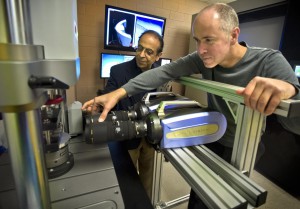 A $1.35 million grant to design more durable materials and accelerate their implementation in composite aircraft. Andrew Makeev, professor in the Mechanical and Aerospace Engineering Department and director of the UT Arlington Advanced Materials and Structures Lab, received the grant from the Army National Rotorcraft Technology Center to build stronger and more durable composite materials for aircraft.
A $1.35 million grant to design more durable materials and accelerate their implementation in composite aircraft. Andrew Makeev, professor in the Mechanical and Aerospace Engineering Department and director of the UT Arlington Advanced Materials and Structures Lab, received the grant from the Army National Rotorcraft Technology Center to build stronger and more durable composite materials for aircraft.
This effort continues a successful Vertical Lift Consortium Program, Advanced Materials Technology, a multi-year joint effort of UT Arlington, Bell Helicopter, Boeing, Sikorsky and Penn State University, also under Makeev’s leadership.
Sikorsky, a VLC member, is a world leader in the design, manufacture and service of military and commercial helicopters; fixed-wing aircraft; spare parts and maintenance, repair and overhaul services for helicopters and fixed-wing aircraft; and civil helicopter operations. Sikorsky helicopters are used by all five branches of the United States armed forces, along with military services and commercial operators in 40 nations.
Makeev will build on the success of the VLC Advanced Material Technology Program in developing, testing and characterizing polymeric composite aircraft material applications and innovative configurations. Makeev’s lab will continue working with material developers in developing laminate reinforcement methods and bonding solutions reducing weight and improving efficiency of vertical lift aircraft.
Makeev also will use heavy analysis to develop consolidated methods for advanced material qualification that will lower implementation costs for the new and improved material systems. Makeev’s lab has developed the key diagnostic and predictive analysis methods under fundamental research projects sponsored by Office of Naval Research and the Army Vertical Lift Research Center of Excellence.
“This effort epitomizes our research mission to accelerate the implementation of composites through close collaboration with industry and government labs – a key to achieving cost-effective performance for the next generation of aircraft,” Makeev said.
Erian Armanios, chair of the Mechanical and Aerospace Engineering Department, said the benefits of Dr. Makeev’s research could impact all future aircraft construction. “This project plays a key role in the implementation of composites in both commercial and military vertical lift aircraft,” Armanios said. “The benefits also will impact fixed-wing aircraft such as the Boeing’s 787 Dreamliner which has 50 percent composites and Airbus A 350 with 53 percent composites.”



